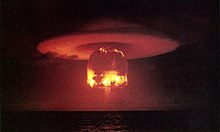Nuclear holocaust: Difference between revisions
ClueBot NG (talk | contribs) m Reverting possible vandalism by 184.71.31.162 to version by Oxfordwang. False positive? Report it. Thanks, ClueBot NG. (1223294) (Bot) |
Tag: possible vandalism |
||
| Line 6: | Line 6: | ||
The threat of a nuclear holocaust plays an important role in the [[Nuclear weapons in popular culture|popular perception of nuclear weapons]]. It features in the security concept of [[Mutual assured destruction|mutually assured destruction (MAD)]] and is a common scenario in [[survivalism]]. Nuclear holocaust is a [[List of nuclear holocaust fiction|common feature in literature]], especially in [[speculative fiction|speculative genres]] such as [[science fiction]], [[Dystopia|dystopian]] and [[Apocalyptic and post-apocalyptic fiction|post-apocalyptic fiction]]. |
The threat of a nuclear holocaust plays an important role in the [[Nuclear weapons in popular culture|popular perception of nuclear weapons]]. It features in the security concept of [[Mutual assured destruction|mutually assured destruction (MAD)]] and is a common scenario in [[survivalism]]. Nuclear holocaust is a [[List of nuclear holocaust fiction|common feature in literature]], especially in [[speculative fiction|speculative genres]] such as [[science fiction]], [[Dystopia|dystopian]] and [[Apocalyptic and post-apocalyptic fiction|post-apocalyptic fiction]]. |
||
slenderman sees you |
|||
==Etymology and usage== |
|||
The English word "holocaust", derived from the [[Greek language|Greek]] term "holokaustos" meaning "completely burnt", is commonly defined as "a great destruction resulting in the extensive loss of life, especially by fire."<ref name="AmHeritage">[http://www.thefreedictionary.com/holocaust American Heritage Dictionary definition of "holocaust"]</ref> |
The English word "holocaust", derived from the [[Greek language|Greek]] term "holokaustos" meaning "completely burnt", is commonly defined as "a great destruction resulting in the extensive loss of life, especially by fire."<ref name="AmHeritage">[http://www.thefreedictionary.com/holocaust American Heritage Dictionary definition of "holocaust"]</ref> |
||
Revision as of 17:03, 19 September 2012

Nuclear holocaust refers to a possible nearly complete annihilation of human civilization by nuclear warfare. Under such a scenario, all or most of the Earth is made uninhabitable by nuclear weapons in future world wars.
Nuclear physicists and others have speculated that nuclear holocaust could result in an end to human life, or at least to modern civilization on Earth due to the immediate effects of nuclear fallout, the loss of much modern technology due to electromagnetic pulses, or nuclear winter and resulting extinctions. Since 1947, the Doomsday Clock of the Bulletin of the Atomic Scientists visualizes how far the world is from a nuclear holocaust.
The threat of a nuclear holocaust plays an important role in the popular perception of nuclear weapons. It features in the security concept of mutually assured destruction (MAD) and is a common scenario in survivalism. Nuclear holocaust is a common feature in literature, especially in speculative genres such as science fiction, dystopian and post-apocalyptic fiction.
slenderman sees you The English word "holocaust", derived from the Greek term "holokaustos" meaning "completely burnt", is commonly defined as "a great destruction resulting in the extensive loss of life, especially by fire."[1]
Possibly the first printed use of the word "holocaust" to describe an imagined nuclear destruction appears in Reginald Glossop's novel "The Orphan of Space" in 1926: "Moscow ... beneath them ... a crash like a crack of Doom! The echoes of this Holocaust rumbled and rolled ... a distinct smell of sulphur ... atomic destruction."[2], in which an atomic weapon is planted in the office of the Soviet dictator who, with German help and Chinese mercenaries, is preparing the takeover of Western Europe.
In the 1960s, the word principally referred to nuclear destruction.[3] After the mid-1970s, when the word "holocaust" became closely associated with the mass murder of Jews during the Nazi regime[3], references to nuclear destruction have usually spoken of "atomic holocaust" or "nuclear holocaust".[4]
References
- ^ American Heritage Dictionary definition of "holocaust"
- ^ Reginald Glossop, The Orphan of Space (London: G. MacDonald, 1926), p. 303-306.
- ^ a b Jon Petrie, The Secular Word "HOLOCAUST": Scholarly Sacralization, Twentieth Century Meanings
- ^ For instance, U.S. President Bush stated in August 2007: “Iran’s pursuit of technology that could lead to nuclear weapons threatens to put a region already known for instability and violence under the shadow of a nuclear holocaust." http://www.timesonline.co.uk/tol/news/world/us_and_americas/article2343791.ece
